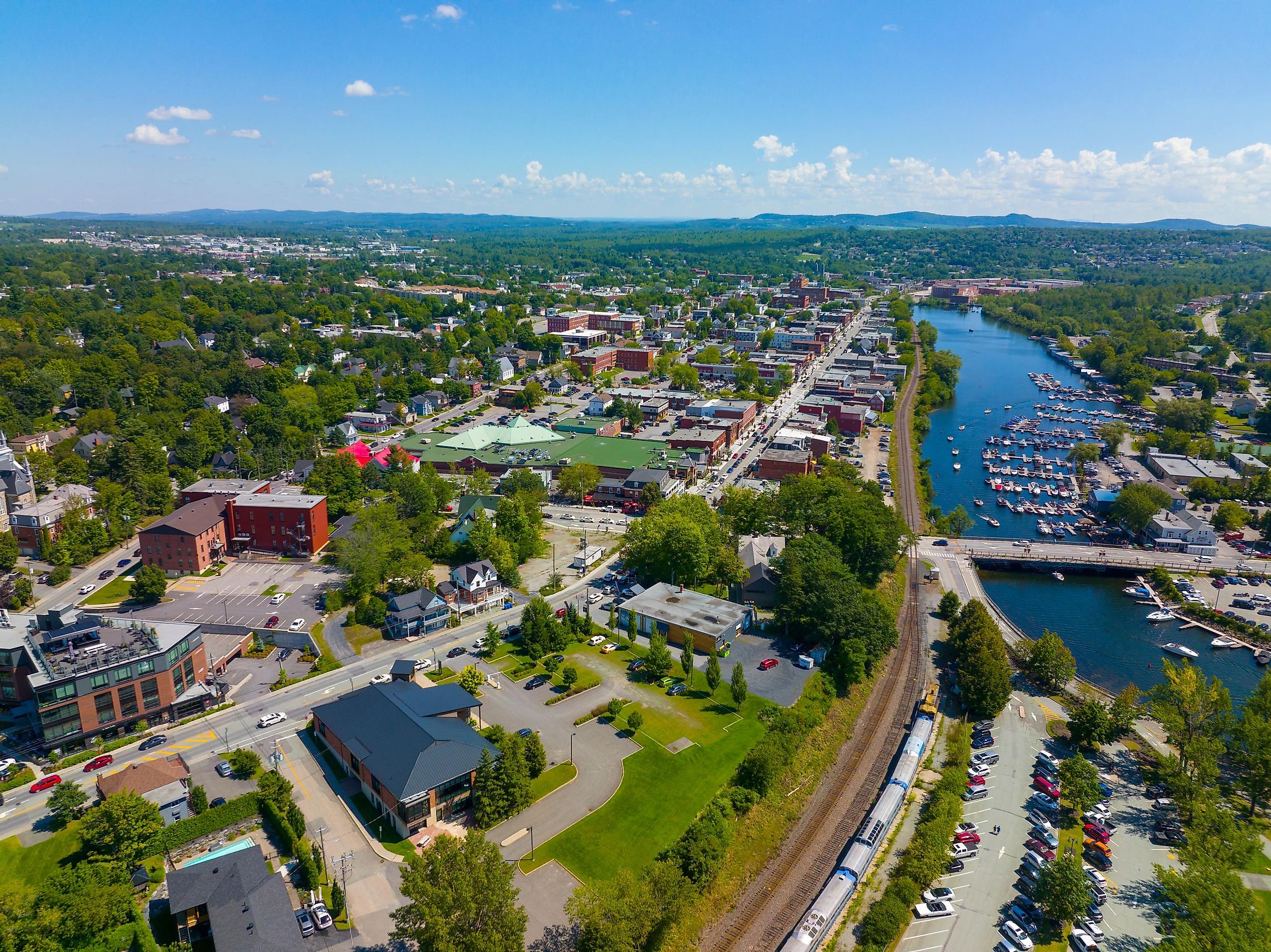
8 Most Charming Small Towns In Quebec
From its whale-watching tours to its old European-style cities, Québec's dazzling myriad of natural and historic sites are why it is one of the most popular tourist destinations in Canada. But when we hear about someone making their way to this French-speaking province, more than likely, they will tell you they visited one (or both) of its two most popular cities: Montreal and Québec City, the province's capital. With a combined 15 million+ visitors every year, these cities certainly contain some of Québec's greatest sights and attractions–but what they lack are the quieter yet equally charming delights of Québec's small towns. These towns and their locals embody the Québec landscape and culture, welcoming visitors to participate in their annual festivals, booming art scenes, glorious coastal atmospheres, and world-class alpine views. From the St. Lawrence shores to the Laurentian Mountains and everywhere in between, here are 8 of the most charming Québec towns you will not want to pass up.
Magog

In Québec's Eastern Townships region, you can find Magog, a quaint Québec town famous for its natural beauty, fabulous outdoor recreation, and spirited festivals. It was once called "the Outlet" due to its setting along the confluence of Magog River and Lake Memphremagog, the sparkling freshwater glacial lake after which it is named. Three-quarters of this reservoir falls within Québec's borders, and Magog is one of the best places to take it all in, whether from shore or from a jet ski. Minutes from downtown, outdoor enthusiasts can also appreciate Marais de la Rivière aux Cerises, a nature area whose woods, marshes, and bogs are straight from the pages of a fairytale. Guided kayak tours are offered from July through August, while wintertime is a beautiful time to snowshoe.
You may just want to visit Magog in the autumn, though, since this is when their acclaimed Fête des Vendanges (harvest festival) takes place. More than 80,000 people make their way to Magog every year to participate in the celebration, a tradition that dates back to 1991. It all started when Jean-Paul Scieur (a local vineyard owner) wanted to celebrate the annual grape harvest–and the rest is history. The festival features live music, over 80 booths (with wines, local bites, and artisanal crafts), and quirky traditions like grape stomping.
Tadoussac
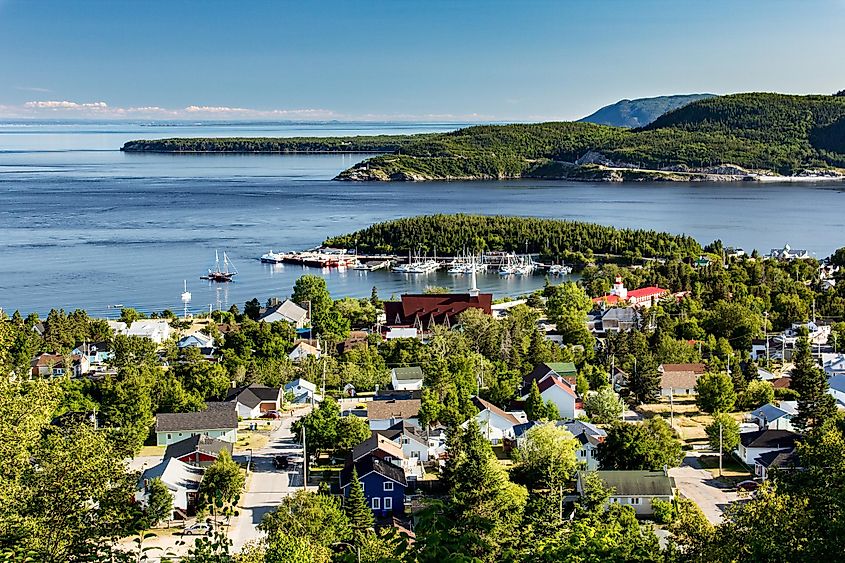
Tadoussac is a far quieter Québec village with just 800 residents, but like Magog, its natural beauty pulls in thousands from near and far. It shares the trait of being located at a confluence (where the Saguenay and St. Lawrence rivers meet), so the views from the land are pretty spectacular. Stroll the Tadoussac Bay boardwalk or the 1-mile De La Plage Trail to access the sandy shores between forest and bay. Saguenay Fjord National Park is also less than 30 minutes from town, granting you entry to 126 square miles of serene wilderness, including the Saguenay Fjord, one of the longest and grandest fjords in the world.
To find out why up to 200,000 people visit this tiny maritime town every year, you will want to book a whale-watching tour with Croisières AML. The Zodiac Whale Watching tours range from 2 hours to an all-day excursion (the latter if you book a private tour), and marine life sightings are guaranteed. So much so that if your captain realizes no marine mammals were spotted during your tour, you can return for another tour free of charge! Witness up to 13 species of majestic marine mammals and whales during your exploration of the Saguenay-St. Lawrence Marine Park, "the best whale watching site in the world". Minke whales, belugas, and humpbacks are just some of the creatures that can be spotted on these once-in-a-lifetime excursions.
Rimouski
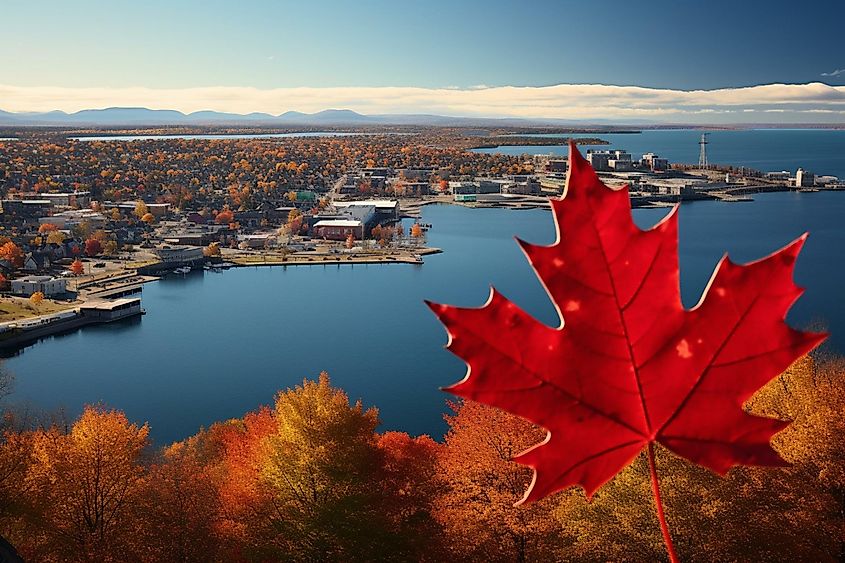
Rimouski, another community settled on the beautiful banks of the St. Lawrence River, is a town anchored by its maritime history and culture. With a population nearing 50,000, there is definitely no lack of attractions to keep you and the locals busy. History buffs can visit the Point-au-Père Historic Site, where 17th-century European settlers once passed through. The site's maritime museum explores a trove of history, including its current exhibition covering the disastrous Empress of Ireland shipwreck whose sinking claimed over 1000 lives in 1914. Before you head back to town, make sure to climb all 128 steps of the 108-ft Pointe-au-Père Lighthouse for breathtaking views of the St. Lawrence. This historic lighthouse is one of the tallest in Canada and has served as an important symbol in this maritime town since 1909.
Bic National Park is another Rimouski treasure, welcoming over 160,000 people annually. This coastal park is brimming with capes, coves, mountains, and islands that can be explored year-round. The main entrance (Rivière-du-Sud-Ouest) is located right here in Rimouski, and if you visit during the wintertime, it is the only entrance that stays open. Keep your eye out for white-tailed deer while hiking the park's 15-mile trail system and seals if you embark on a sea kayaking excursion. In the wintertime, 10 miles of snowy trails are carefully sculpted for those looking to snowshoe, while others may prefer the more rugged backcountry skiing paths. But no matter what time of year you visit, Rimouski guarantees a gateway to adventure.
Baie-Saint-Paul
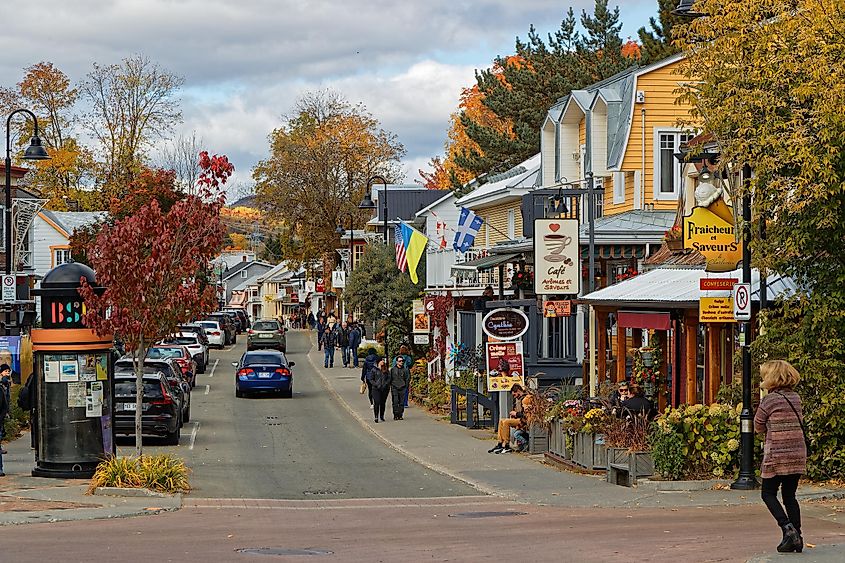
Make your way to the northern shores of St. Lawrence. The cliff-bordered town of Baie-Saint-Paul is one of the province's oldest municipalities and quaintest Québec communities. Old town charm is one of the first things you notice when you walk its narrow streets (the town was founded over 350 years ago, after all), which is evident in the century-old homes. Baie-Saint-Paul also continues to live up to its reputation of being the birthplace of Cirque du Soleil (the world's largest contemporary circus company in the world) through its thriving art scene. Summertime is a great time to visit the Le Festif de Baie-Saint-Paul (The Baie-Saint-Paul Festival). This inclusive weekend-long event spreads across the downtown area, spotlighting new and established artists, totaling more than 130 shows and 110 performers.
As far as year-round attractions go, you can find Baie-Saint-Paul packed to the brim with art galleries. The town has one of the highest concentrations of galleries per capita in all of Canada, making it heaven on earth for artists and collectors alike. Make your way to Saint-Jean-Baptiste Street for a day of gallery hopping–there are more than ten here alone, and this is just the tip of the iceberg. Galerie d'art Beauchamp, Iris Art Gallery, and Galerie d'Art Charlevoix are just a handful within walking distance of the Riviere du Gouffre, a babbling tributary of the St. Lawrence. The Baie-Saint-Paul Museum of Contemporary Art is also just around the corner.
La Malbaie

Around 40 minutes northeast of Baie-Saint-Paul, La Malbaie is yet another Québec community straddling the mighty St. Lawrence. This darling resort town has welcomed visitors for over 200 years, including United States President William Howard Taft, who summered here in the early 1900s and inspired other American and Canadian elites to do the same. Since then, the town has continued to flourish as one of Canada's most popular getaway destinations.
Although Taft appreciated La Malbaie for its summers, today, many visitors enjoy La Malbaie for its winter sports. The Mont Grand-Fonds ski resort features 20 exhilarating trails for a range of abilities, along with 87 miles of cross-country ski paths and 25 miles of snowshoe trails. But if you want to follow in Taft's footsteps and hit up La Malbaie in the summertime, the Mont Grand-Fonds still has you covered. The mountain boasts a summit altitude of 2411 feet, and the hikes offer absolutely stunning views of the St. Lawrence and Laurentian mountain ranges. Back in town, some other year-round attractions include gambling at the Hôtel-Casino de Charlevoix or grabbing a bite at Maison du Bootlegger, an authentic speakeasy from prohibition times set in a historic 1860s home.
Gaspé
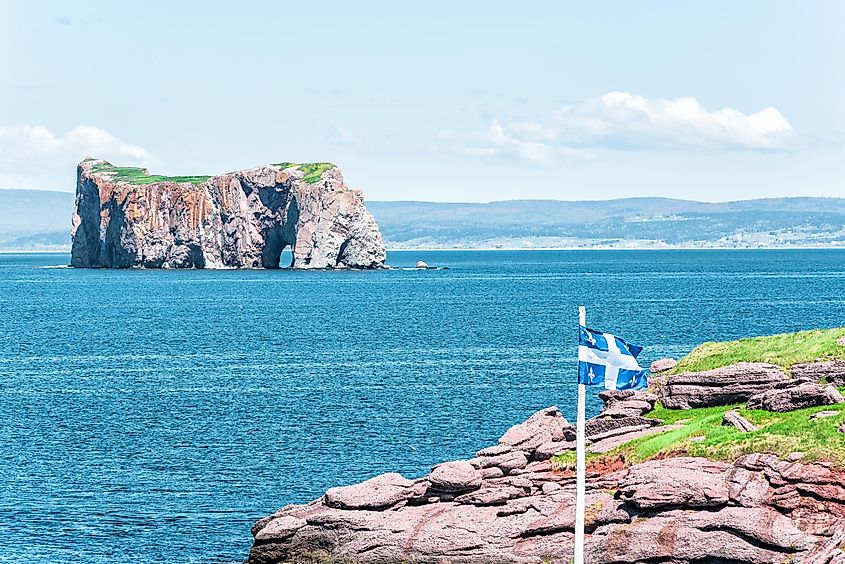
In Québec's gorgeous Gaspésie region lies the charming coastal town of Gaspé. You can discover its charms at the very tip of what National Geographic once listed as a top travel destination in Canada: the Gaspé Peninsula. It was here in Gaspé that maritime explorer Jacques Cartier erected a cross in 1534, claiming possession of what is now Canada, on behalf of the king of France. Today, Gaspé is a hub for the surrounding towns in the region, but even those intending to pass through will find themselves sticking around for the town's temptations.
Stop by the Gaspesie Museum (Musée de la Gaspésie) to learn more about the Gaspé Peninsula's fabulous history, reaching back over 380 million years. In the summertime, the museum grounds are worth exploring for a chance to see a replica of the cross Jacques Cartier positioned so long ago. Warm weather is also a great time to hit up Haldimand Beach for some sandy seaside fun, located just 5 miles from Gaspé's downtown or Forillon National Park, one of Canada's most beautiful nature areas. The 95-square-mile park embodies everything the Canadian wilderness is known for, including salmon fishing, Appalachian hiking trails, scuba diving, moose spotting, and whale watching.
Saint-Sauveur

If the mountains beckon you, Saint-Sauveur is an adorable Laurentian alpine town definitely worth visiting–and it is less than 1 hour from Montreal. Residents of the bustling megacity love Saint-Sauveur for its year-round attractions, taking a particular liking to the slopes. Snow season is all about skiing at the Sommet Saint-Sauveur resort, whose 43 ski paths include anything from mild bunny hills to trails that will get any adrenaline seeker's heart pumping. With 142 acres of skiable terrain (and a 700-foot vertical drop), Saint-Sauveur Summit is a skier's dream.
If downhill sports are not your cup of tea, or you find yourself in Saint-Sauveur in the summertime, the mountains are still up for exploring. The 2-mile Summit of Mont Saint-Sauveur trail is a moderately challenging out-and-back hike well worth the effort for the rewarding panoramic views. The annual Festival des Arts de Saint-Sauveur (Saint-Sauveur Arts Festival) is also an extremely popular summer event you will not want to miss. The festival has continued to flourish for over 30 years, luring more and more people every year with its host of hypnotic dancers and talented musicians from Québec and beyond.
Mont-Tremblant
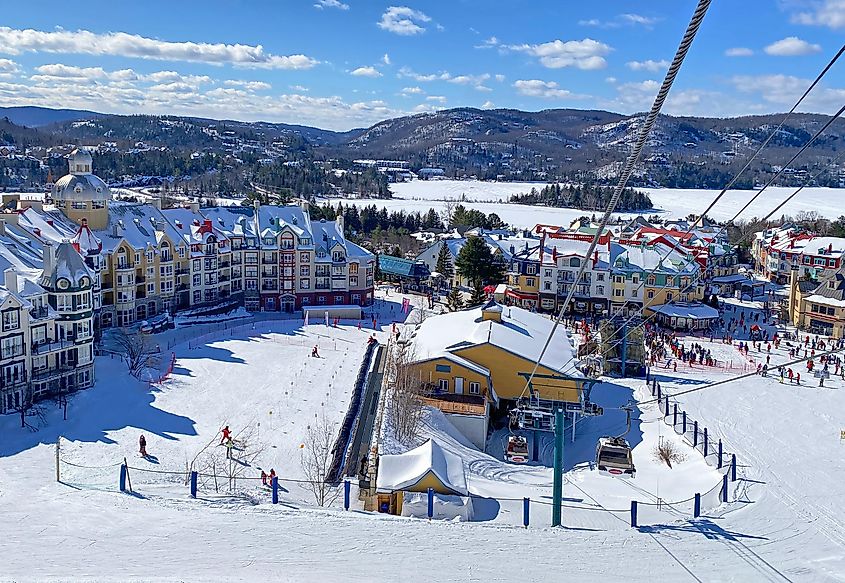
Further into the Laurentian Mountains, Mont-Tremblant is another alpine town with unbeatable charms. It is a gateway to natural attractions like the nearby Parc National du Mont-Tremblant, the 1st national park in Québec, and the 6th in all of North America. Visitors can explore its six grand rivers or 400 lakes and streams by canoe or hike any of the countless trails within this massive 583-square-mile nature haven. Adventurous explorers can also get the chance to try out the Via Ferrata du Diable for a dazzling blend of hiking and mountain climbing. Professional guides will buckle you to steel cables running the length of the cliff whose path you will follow, overlooking the Diable River.
Like Saint-Sauveur, this mountain community is also largely centered around its ski culture. The Mont-Tremblant Ski Resort is by all means a winter wonderland, making it one of Québec's favored ski and holiday destinations. The panoramic gondola is a great way to take in the snowy sights with a bird's eye view, while others prefer to enjoy the winter breeze on their cheeks on one of the resort's 102 ski runs. For holiday shopping and wintertime treats, stroll the resort's adorable pedestrian village at the foothills of Mont-Tremblant. Year-round, the cobblestone streets and European-style shops pay homage to Montreal and Old Québec. In the winter, you will find the streets and buildings decorated with traditional Christmas wreaths and garland, adding an especially festive touch. Stop in at one of the 35 shops to get everything on your holiday list, and make sure to lend a hand at Cabane à Sucre de la Montagne, where visitors can participate in freezing their own sugary maple treat in the snow.
Final Thoughts
Whether venturing to Québec's mountainsides for a ski trip or savoring its beachy shores in the summertime, this Canadian province has something incredible each and every season for any type of traveler. Participate in local celebrations, like Magog's harvest party or Baie-Saint-Paul's art festival. Rejuvenate at one of the province's many resort towns, like La Malbaie, Saint-Sauveur, or Mont-Tremblant. Or embrace Québec's fabulous maritime history and culture in one of the countless communities on the mighty St. Lawrence. No matter the destination you choose, once you get a taste of Québec's small towns and their charms, you may find yourself adding the rest to your travel bucket list.










